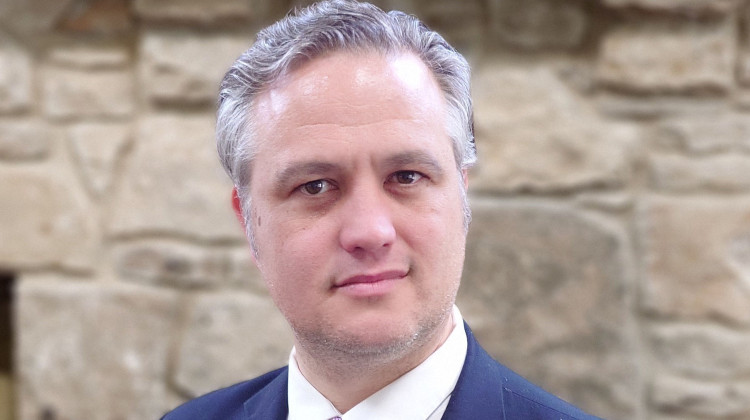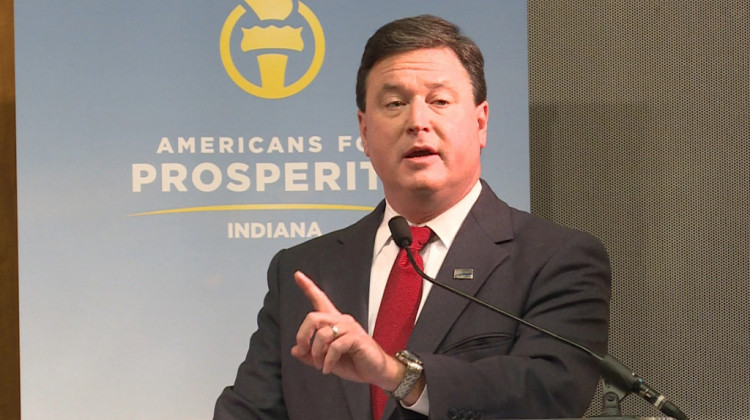
Robby Slaughter is a business owner. He has previously worked as a motivational speaker and as an associate faculty member at IUPUI in the School of Engineering and Technology.
Photo from Robby Slaughter's campaign websiteWFYI is speaking with U.S. House of Representatives candidates running for election in Central Indiana.
Independent Robby Slaughter is running for office in the 5th Congressional District, which represents parts of Hamilton, Madison and Howard County. He faces incumbent Republican Victoria Spartz, Democrat Deborah Pickett, and Libertarian Lauri Shillings.
Slaughter is a business owner. He has previously worked as a motivational speaker and as an associate faculty member at IUPUI in the School of Engineering and Technology.
WFYI’s Jill Sheridan met with Slaughter to discuss why he’s running for the seat.
This transcript has been lightly edited for clarity and style. WFYI fact checks all candidate interviews and provides editor’s notes in the audio and digital publications.
Jill Sheridan: Thank you so much for coming in today to chat. As you are a candidate for District 5 in this year's election. Can you tell us a little bit about why you're running for election in this district?
Robby Slaughter: There's an old expression Jill that insanity is doing the same thing over and over again and expecting different results. And for a long time in this country, in our community, we've been going after the same basic choices: the Republicans and Democrats. And they aren't doing much for us. In fact, approval rating in Congress is down lower than it ever has been, almost to the single digits.*
We are disgusted by our two choices. We feel the choices are effectively the same. They're both controlled by the same set of money and corporations and people, especially me, are tired of not having real choices, and I think that we're at a crossroads in our country. We're in a difficult place and time, and we need new ideas, new people who are not part of the broken system.
And that's why I'm here, and I feel, if not me, then who? If not now, then when? Something has to be done. So I put aside my business, put aside my other areas of interest, and I'm focusing full time to run as an independent for this campaign.
*Editor’s note: According to Gallup overall congressional approval rating is low, but not the lowest it’s ever been, which was recorded in 2013 at 9 percent.
Sheridan: Can you talk a little bit about what you think is the most important issue facing voters in District 5 today?
Slaughter: The most important issue is not foreign policy, it's not education, it's not the economy. The most important issue is trust. We don't trust our elected representatives. We don't trust almost anyone in the government. We barely trust our neighbors anymore, and without trust, nothing is possible.
We're in a difficult situation now, because trust is so low that no matter what a politician says, we don't believe that it's really going to happen. And because trust is so low, there is no real way to compromise, to collaborate, to get things done, and most elected officials simply operate independently of what anything the public might want or need. And the only way to restore trust is to do this, to talk to people, one-on-one, be available to the press, be available to individuals, and most importantly, to give up power.
That's why we need term limits. That's why we need radical transparency for financial disclosure and financial components. That's why we need to fix the way we fund campaigns and elections, because there is almost no trust right now. Without it, nothing viable is possible.
Sheridan: Housing has become more of an issue for people in the district. What measures do you think could improve affordable housing options for people?
Slaughter: Well, first of all, we need to build more housing. We need to make it easier for individuals to build houses and to build places to live. We also need to embrace the reality that a wide variety of housing structures make sense based on the demographics and geography of the area.
And we need to understand that the more housing options there are, the more affordable houses will be for everybody, and right now we're facing a massive shortage in housing, especially in the fifth district, but really across the state of Indiana, in many parts of the country, and that shortage is leading to difficulties and finding places to live, whether you want to rent, whether you want to buy, it's very hard to find something that makes sense, and the lack of available stock is the biggest driver in this area.
So making it easier to build more stock, making loan progress more available, building more options, will have a dramatically positive impact on the housing situation.
Sheridan: And of course, the economy is top of mind for many voters across Indiana. How would you support policies that could improve inflation and create more opportunity for voters?
Slaughter: Well, I've got bad news for you. Inflation is not the result of direct government policy, as much as it's a function of the nature of a free market economy. Inflation is simply a measure of prices, and prices are up because companies realize they can charge more and we will pay for it, and so the best answer is to increase wages to continue to match those prices, and that's the history of our country. You can spend a lot more money today than you did in the past because you made more money, and the more that wages continue to rise, to reflect and reflect the changes in prices, the more comfortable people would be.
Now, the way to do that is to continue, obviously, to continue to lower spending. And as we decrease the tax burden and decrease the spending burden on the federal government, we will see a secondary effect in the economy. But I think most importantly, it's key to recognize that inflation is driven by prices, and prices are set by companies and as we make choices as consumers, what to buy and, most importantly, what not to buy, will have the biggest impact on those prices overall.
Sheridan: Public safety and violence, obviously in larger urban areas has been an issue, but it's becoming more and more of an issue in many smaller communities as well that are across District 5. How would you propose a reduction in violence, and specifically gun violence?
Slaughter: I've had the opportunity to participate in both the Carmel and Noblesville citizens police academies. I've done ride-alongs with departments across the district. I've met with sheriffs and chiefs of police. I've learned all about law enforcement, policing and public safety issues, and clearly across the board, the theme is the same.
What we need are more comprehensive wraparound services, especially relating to mental health and social work. I was just up talking to one of the folks who helped to manage a jail on the north end of the district, and they were mentioning the importance of getting a social worker to be in their jail full time, because most of the issues they face now are related to mental health.
Carmel now has a couple of officers that go out with social workers to respond to calls. There are now comfort animals. There are dogs that have been trained to help reduce tension in the situation. And these affect violent crime and also issues as well. And these sorts of integrations with policing into more sensible health based community services are the biggest opportunity to make a dramatic change in the amount of violence we're experiencing in our communities.
They're not that expensive. They're actually what's being asked for by departments, but we need the political will, the leadership to make them happen.
Sheridan: Many communities as well are facing a lack of healthcare access, costs also on the rise. What policies do you think would help?
Slaughter: The health care costs have been increasing dramatically, and it's very interesting to look at that, because so many of those costs are effectively created by the way that we operate healthcare in America. Here's a good factoid to keep in mind, half of all of the medical research dollars in the world are spent in America, which means, in effect, they're paid for by America even though we only make up 5% of the patients.*
We subsidize the rest of the world's health care, not just in terms of research, but also in terms of drug costs. We pay more on average, for drugs and medical procedures than other countries because we subsidize them. Our Medicare and Medicaid programs can't even negotiate for the cost of medicine like other private plans can, and a lack of transparency in pricing has also created issues.
Now, we've made some progress on that in Congress in the past few years, but not nearly enough. Providing more information about what's going on in the market will give people more options. And also making sure that there is more preventative care. In fact, one of the biggest reasons our health care costs are so high is because overall health is so low.
You look at our other peer countries, and frankly, they're just in better shape than we are. And the more that we can get into better shape, the more that we can spend more time outside, more time exercising and maybe eating a little bit better, the lower our healthcare costs will be. Now that's on all of us to do, but the government can have an enormous role in helping to promote good behavior and to transform our experiences with the health care system.
*Editor’s note: The Organisation for Economic Co-operation and Development says spending on research and development in 2021 was roughly $1.64 trillion. Of that total, $726 billion was spent by the U.S.. That's about 45% of total spending being done by the US. The United States makes up less than 5 percent of the world’s population.
Sheridan: Reproductive rights also top of mind for many voters, what's your opinion on the changes of women's health care?
Slaughter: That's the toughest question that you could possibly ask, and I think that it's something which is intensely personal. If you've ever been in a situation where you're helping or counseling someone who is going through this difficult choice that you know, it is not a black and white issue. And I think one of the main failings of the political establishment is to try to force us into one of two boxes, when the reality is, most of us agree we want to have fewer abortions.
We want people who do get pregnant to have more options, and we want people to be able to make better choices around their sexual health. And yet so much of our system is based not on doing that, but really focusing on these extreme rhetoric. I think that if we can put our effort into what we know works, which is providing the kinds of services, whether it's prenatal care and health care for folks who do get pregnant, whether it's making sure that adoption services are widely available and effectively free of charge, and that women's health is protected where it makes sense as a private conversation between a woman and her doctor.
Those things are all essential, but none of those should get away from our most fundamental question about the role of government, which is that we know that government is not a moral institution. Government's role is to serve the people and to reflect the society the people are in, and we know from American history that prohibition of behavior is not an effective way to change the culture.
What changes the culture, what shifts us from behaving one way as a group of people to another, is to shift our understanding of the role of our behaviors. And I think that in the future, if we continue to make good choices as a country, we continue to ensure smart choices as individuals, we’lll see the abortion rate continue to decline, which it has for the past 50 years, and I think that prohibitions and laws around those things will not be nearly as effective as the work to try to promote good behavior around giving birth, prenatal care, adoption services and so on.
Sheridan: Environmental change is impacting communities in district five and beyond, from agriculture to water, what type of protections and policies would you like to see?
Slaughter: Well, I mentioned before that the most significant issue we face in our country is a lack of trust, and that lack of trust extends to our understanding of science. The difficulty here is that the near universal consensus across science is that human behavior affects the environment, and human behavior has had a larger impact on the environment in recent decades than ever before.
And even though that is the broad consensus of the experts, our trust in science is so low that any kind of policy based on the scientific consensus is unlikely to be received well by individuals. And so that's why I think that, as much as we want to focus on these broad questions, that will really help to clean up our rivers and improve our communities and have effects on our environment and our atmosphere.
We've got to also focus on the education and on restoring trust with individuals, because that trust has been so lost that it almost doesn't matter what the experts say. It doesn't even matter if the experts are technically correct. What matters is do people believe, do they have the trust in the experts that it makes sense to follow their advice, or are they going to do their own thing regardless of what those who have spent their entire life studying it have to say.
Sheridan: Can you tell us who you're backing for Indiana governor and U.S. president in this upcoming election?
Slaughter: I think one of the mistakes that we have made in this country is that we have changed politics from being an individual activity, where you as a candidate promote ideas and engage with voters, to being one that's about factions.
In fact, George Washington warned about this in his farewell address, to not become a factionalized country. And I don't think that candidates should endorse other candidates. I don't think candidates should work together. I don't think it really has shown to be a great deal of value to have these political parties where you have to vote for one person along with somebody else in that same party.
Here in Indiana, we have seen in the Lieutenant Governor and Governor's race, how you're not really voting for one person, you're voting for a pair of people, and the mechanism by which still people get selected is largely anti-democratic. So we're not even experiencing the democratic process in a way that honors the tradition and concepts of our founders as a nation.
So I don't want to endorse anybody, and I don't think politicians should be in the business of endorsing, they should be focused on building relationships with voters, developing policy ideas and winning on their own merits, not of the coattails or the endorsements of others.
Sheridan: Thank you so much for taking time today.
Slaughter: My pleasure. Happy to be here.
 DONATE
DONATE







 Support WFYI. We can't do it without you.
Support WFYI. We can't do it without you.